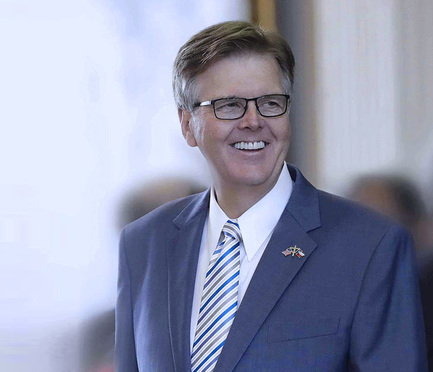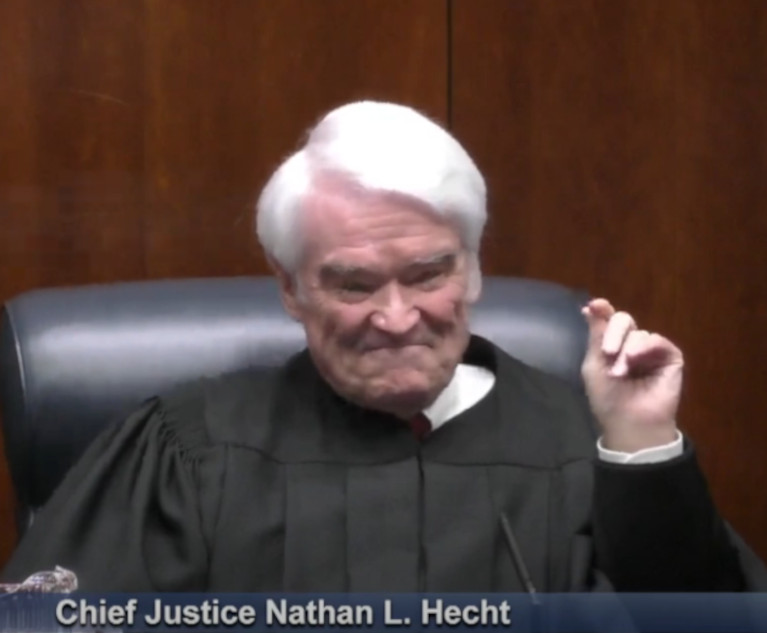Public Doesn't Support Stripping Vote for Texas Judges, Lt. Gov. Says
"Texans feel strongly about voting for their judges. The commission will need to make a compelling argument to the people and legislators to change the current system. I do not believe that support exists today," Lt. Gov. Dan Patrick said.
January 10, 2020 at 05:56 PM
3 minute read
 Texas Lt. Gov. Dan Patrick/courtesy photo
Texas Lt. Gov. Dan Patrick/courtesy photo
Texas Lt. Gov. Dan Patrick is pushing back against the thought of eliminating partisanship from judicial elections.
In a statement Friday, one day after the new Texas Commission on Judicial Selection met for the first time and identified partisan judicial elections as a major problem, Patrick issued a statement saying he was surprised it appeared the commission supported eliminating partisanship before it began hearings.
"I expect the members to have an open mind on every issue—including the partisan election of judges—with the single goal of making sure Texas continues to maintain one of the best judicial systems in the country," Patrick said. "Texans feel strongly about voting for their judges. The commission will need to make a compelling argument to the people and legislators to change the current system. I do not believe that support exists today."
The Texas Legislature tasked the judicial selection commission with studying a long list of judicial selection methods this year and issuing a report and recommendations for lawmakers for the 2021 legislative session.
The commission met Thursday in Austin, spending most of its time identifying major problems with Texas' current system. Among other things, members identified partisan elections as problematic because good judges are swept out of office, and political contributions in judicial campaigns as an issue because they appear improper.
Read more:
Forget the 'R' and 'D': Commission Wants No More Politics in Selecting Texas Judges
At one point in the meeting, commission Chairman David Beck asked members whether anyone felt that partisanship in judge races was not a problem.
Only Sen. Joan Huffman, R-Houston, spoke up, saying she is unconvinced the state should eliminate partisanship. She explained that although she herself is a former district judge, even she struggles to keep up with all the judge races and knows it's almost impossible for most voters. At least listing a political party on the ballot gives voters one thing to go on.
"I'm not saying it's not a problem," she added.
At the meeting, all of the commission members said they'd keep their minds open as the commission studies the issue this year. They also committed themselves to challenging preconceived notions about judicial elections, and not allowing past failed attempts at reform to sway their thinking.
Beck appointed three subcommittees to conduct the research. One of them, the elections subcommittee, was tasked to "critique the current system of partisan elections, provide the pros and cons of nonpartisan elections, and discuss the usefulness of retention elections in a new system."
Beck didn't immediately return a call or email seeking comment.
This content has been archived. It is available through our partners, LexisNexis® and Bloomberg Law.
To view this content, please continue to their sites.
Not a Lexis Subscriber?
Subscribe Now
Not a Bloomberg Law Subscriber?
Subscribe Now
NOT FOR REPRINT
© 2025 ALM Global, LLC, All Rights Reserved. Request academic re-use from www.copyright.com. All other uses, submit a request to [email protected]. For more information visit Asset & Logo Licensing.
You Might Like
View All
ExxonMobil Sues California AG Bonta, Environmental Groups for Advanced Recycling 'Smear Campaign'

2 Judges: Meet the New Chief Justice and the GC Who Just Rose to the Bench
3 minute read

Trending Stories
- 1More Litigation Coming? Insulin MDL Gets Boost from FTC Report
- 2Judge Spends 3 Hours Explaining His Decision
- 3Morgan Lewis Closes Shenzhen Office Less Than 2 Years After Launch
- 4On The Move: Freeman Mathis & Gary Adds Florida Partners, Employment Pro Joins Jackson Lewis
- 5New Trouble for Allstate: National Class Action Targets Insurer
Who Got The Work
J. Brugh Lower of Gibbons has entered an appearance for industrial equipment supplier Devco Corporation in a pending trademark infringement lawsuit. The suit, accusing the defendant of selling knock-off Graco products, was filed Dec. 18 in New Jersey District Court by Rivkin Radler on behalf of Graco Inc. and Graco Minnesota. The case, assigned to U.S. District Judge Zahid N. Quraishi, is 3:24-cv-11294, Graco Inc. et al v. Devco Corporation.
Who Got The Work
Rebecca Maller-Stein and Kent A. Yalowitz of Arnold & Porter Kaye Scholer have entered their appearances for Hanaco Venture Capital and its executives, Lior Prosor and David Frankel, in a pending securities lawsuit. The action, filed on Dec. 24 in New York Southern District Court by Zell, Aron & Co. on behalf of Goldeneye Advisors, accuses the defendants of negligently and fraudulently managing the plaintiff's $1 million investment. The case, assigned to U.S. District Judge Vernon S. Broderick, is 1:24-cv-09918, Goldeneye Advisors, LLC v. Hanaco Venture Capital, Ltd. et al.
Who Got The Work
Attorneys from A&O Shearman has stepped in as defense counsel for Toronto-Dominion Bank and other defendants in a pending securities class action. The suit, filed Dec. 11 in New York Southern District Court by Bleichmar Fonti & Auld, accuses the defendants of concealing the bank's 'pervasive' deficiencies in regards to its compliance with the Bank Secrecy Act and the quality of its anti-money laundering controls. The case, assigned to U.S. District Judge Arun Subramanian, is 1:24-cv-09445, Gonzalez v. The Toronto-Dominion Bank et al.
Who Got The Work
Crown Castle International, a Pennsylvania company providing shared communications infrastructure, has turned to Luke D. Wolf of Gordon Rees Scully Mansukhani to fend off a pending breach-of-contract lawsuit. The court action, filed Nov. 25 in Michigan Eastern District Court by Hooper Hathaway PC on behalf of The Town Residences LLC, accuses Crown Castle of failing to transfer approximately $30,000 in utility payments from T-Mobile in breach of a roof-top lease and assignment agreement. The case, assigned to U.S. District Judge Susan K. Declercq, is 2:24-cv-13131, The Town Residences LLC v. T-Mobile US, Inc. et al.
Who Got The Work
Wilfred P. Coronato and Daniel M. Schwartz of McCarter & English have stepped in as defense counsel to Electrolux Home Products Inc. in a pending product liability lawsuit. The court action, filed Nov. 26 in New York Eastern District Court by Poulos Lopiccolo PC and Nagel Rice LLP on behalf of David Stern, alleges that the defendant's refrigerators’ drawers and shelving repeatedly break and fall apart within months after purchase. The case, assigned to U.S. District Judge Joan M. Azrack, is 2:24-cv-08204, Stern v. Electrolux Home Products, Inc.
Featured Firms
Law Offices of Gary Martin Hays & Associates, P.C.
(470) 294-1674
Law Offices of Mark E. Salomone
(857) 444-6468
Smith & Hassler
(713) 739-1250






